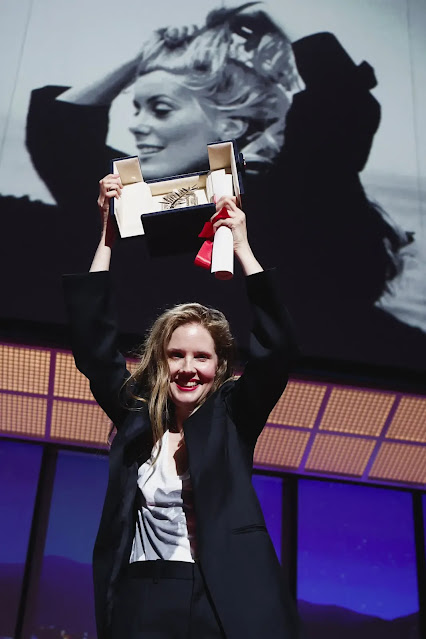In the seconds before the Palme d’Or was announced at Saturday night’s closing ceremony of the Cannes Film Festival, the crowd felt ready to explode to its feet. Through the process of elimination, everyone had figured out that the winner would be French director Justine Triet for her riveting courtroom drama “Anatomy of a Fall.”
And with that win, she became just the third female director to win the festival’s highest prize, following Jane Campion for “The Piano” in 1993 and Julia Ducournau for “Titane” in 2021. This is a year when an unprecedented seven films in competition were directed by women, after decades of criticism of the festival for failing in that regard.
The competitors included the only first-time filmmaker to make it into the main selection, Ramata-Toulaye Sy, the 36-year-old French Senegalese director of “Banel & Adama.” Even the opening film, “Jeanne du Barry” starring Johnny Depp, was directed by actress and former model Maïwenn (though it was not part of the competition).
Inside the press room, there was an audible gasp when the jury announced that Jonathan Glazer’s “The Zone of Interest” would win the Grand Prix, or second prize — clearing the field for Triet’s win.
Glazer had been the presumed favorite going into the ceremony for his chilling depiction of the family of Rudolf Höss, a Third Reich middleman living a pastoral life with his family during World War II on an estate that shares a wall with Auschwitz. The film is based on a 2014 novel of the same name by Martin Amis, who died at age 73 this month, soon after Glazer’s film premiered.
“The Zone of Interest” is Glazer’s first film in 10 years, following his hypnotic “Under the Skin,” starring Scarlett Johansson as an alien who drives around Glasgow, Scotland, looking for men to devour. During a brief news conference with the jury (which included Ducournau), reporters could not stop asking why they chose Triet’s film over Glazer’s, with one journalist blatantly saying that many members of the press liked “Zone” better.
The jurors shared their reasons briefly.
“It’s exactly what cinema should be about,” said “Triangle of Sadness” director and two-time Palme winner Ruben Östlund, who headed the jury, adding that its members responded to the “intense” audience reaction during the premiere. “We are really keeping the critics out. We don’t listen to what you’re saying during this week,” he added, to some applause.
Triet’s film “created a conversation and a conversation that we loved, and I would hate to put any sort of language to it because I think it’s worthy, as all films are, to be experienced,” said Brie Larson, who also sat on the jury with fellow American actor Paul Dano.
Coincidentally, both “Anatomy of a Fall” and “Zone” star German actress Sandra Hüller, who may be the biggest winner of the night, and has been vaulted into the Oscars conversation. In “Zone” she plays Höss’s wife, Hedwig, who likes her life next to Auschwitz so much that she refuses to move when her husband is transferred. In “Anatomy,” she plays a novelist put on trial for murder after her husband is found dead in the snow outside their home in the French Alps.
Saturday was also a huge night for Asian cinema, with French Vietnamese director Tran Anh Hung (“The Scent of Green Papaya”) winning for his lovely “The Pot au Feu,” which essentially depicts Juliette Binoche cooking in a 19th-century French manor kitchen for 2½ hours. There were also two Japanese winners, with Koji Yakusho winning best actor for “Perfect Days” from Wim Wenders, in which he plays a soft-spoken man who cleans toilets, and Sakamoto Yuji winning best screenplay for “Monster” — a coming-of-age story of two boys from director Hirokazu Kore-eda that on Friday night had won the Queer Palm award from a jury headed by John Cameron Mitchell.
Triet, 44, used her acceptance speech to talk about the protests this year in France over raising the retirement age, as well as the “merchandising of culture by a liberal government,” which she said had stifled the French film industry and made it harder for young directors to make mistakes.
The winners
COMPETITION
Palme d’Or: “Anatomy of a Fall,” Justine Triet
Grand Prix: “The Zone of Interest,” Jonathan Glazer
Director: Tran Anh Hung, “The Pot au Feu”
Actor: Koji Yakusho, “Perfect Days”
Actress: Merve Dizdar, “About Dry Grasses”
Jury Prize: “Fallen Leaves,” Aki Kaurismaki
Screenplay: Sakamoto Yuji, “Monster”
OTHER PRIZES
Camera d’Or: “Inside the Yellow Cocoon Shell,” Thien An Pham
Short Films Palme d’Or: “27,” Flóra Anna Buda
Short Films Special Mention: “Fár,” Gunnur Martinsdóttir Schlüter
Queer Palm: “Monster”
UN CERTAIN REGARD (for first- and second-time directors)
Un Certain Regard Award: “How to Have Sex,” Molly Manning Walker
Jury Prize: “Hounds,” Kamal Lazraq
Best Director Prize: “Mother of All Lies,” Asmae El Moudir
Freedom Prize: “Goodbye Julia,” Mohamed Kordofani
Ensemble Prize: “The Buriti Flower,” João Salaviza, Renée Nader Messora, cast and crew
New Voice Prize: “Omen,” Baloji
DIRECTORS’ FORTNIGHT
Europa Cinemas Label: “Creatura,” Elena Martín
Society of Dramatic Authors and Composers Prize: “A Prince,” Pierre Creton
CRITICS’ WEEK
Grand Prize: “Tiger Stripes,” Amanda Nell Eu
French Touch Prize: “It’s Raining in the House,” Paloma Sermon-Daï
GAN Foundation Award for Distribution: Pyramide Films, “Inshallah a Boy”
Louis Roederer Foundation Rising Star Award: Jovan Ginic, “Lost Country”
« J’aimerais dédier ce prix à toutes les femmes qui mènent une lutte pour surmonter les difficultés pour exister dans ce monde.»
— France 2 (@France2tv) May 27, 2023
Le prix d'interprétation féminine revient à Merve Dizdar pour son rôle dans Les Herbes sèches de Nuri Bilge Ceylan.#Cannes2023 pic.twitter.com/uTB4Lvbc31
Le discours engagé de Justine Triet, réalisatrice de "Anatomie d'une chute", au moment de recevoir la Palme d'Or de ce 76ème @Festival_Cannes.#Cannes2023 pic.twitter.com/yEQXaCIlrX
— france.tv cinéma (@francetvcinema) May 27, 2023


